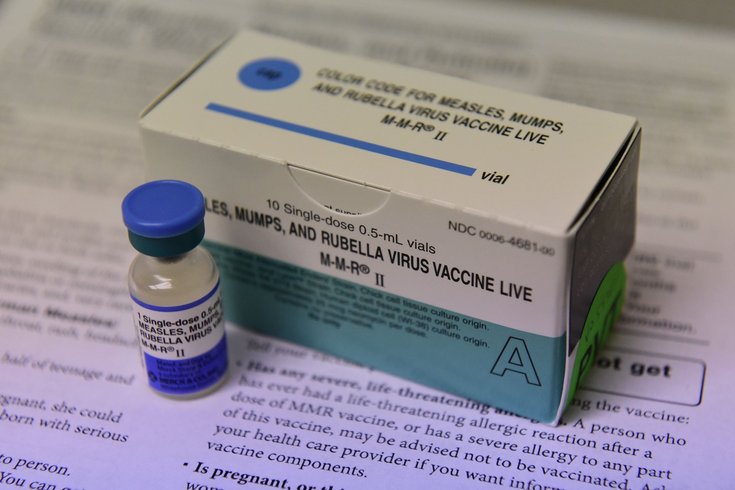
March 19, 2024
 Zach Tuggle/News Journal/USA Today Network
Zach Tuggle/News Journal/USA Today Network
U.S. health officials have issued an alert about rising measles outbreaks around the world and are advising that all travelers be up-to-date on the MMR vaccine, pictured here. Even babies 6 months and older should be vaccinated, health officials said.
U.S. health officials are warning the public about rising measles outbreaks around the world and advising parents and caregivers to vaccinate young children against the disease.
Decreasing vaccination rates around the globe have resulted in spiking measles outbreaks, including in the United States. As of March 14, 17 states, including Pennsylvania, have reported a total of 58 measles cases this year – 54 of which were linked to international travel. Most cases reported in 2024 were among children who had not received the measles, mumps and rubella vaccines, according to the U.S. Centers for Disease Control and Prevention.
Nine people in the Philadelphia area tested positive for measles between December and January. No new cases have since been identified, according to the Philadelphia Department of Public Health, which cites that 93% of city residents are up-to-date on their measles, mumps and rubella (MMR) vaccines.
The city's health department maintained a blog post with the latest information on measles before declaring the local outbreak over on Feb. 24.
The CDC is advising that all U.S. residents traveling abroad, regardless of their destinations, be vaccinated against measles and that health-care providers should help ensure children are current on their MMR vaccines. Even babies as young as six months should be vaccinated, the CDC advises.
Measles, also called rubeola, is an easily transmissible viral infection that can lead to serious health issues, such as pneumonia and encephalitis, and can even be fatal, especially for young children. Measles is almost entirely preventable with the MMR vaccine.
With declining vaccination rates around the world, measles outbreaks have been on the rise, including in the United States – despite a U.S. declaration of measles elimination in 2000. Domestic outbreaks are mostly due to people infected in other countries who travel to the United States.
"Most importations come from unvaccinated U.S. citizens," according to the CDC.
MMR vaccines are safe and highly effective. Two doses have proven to be 97% effective against measles and one dose is 93% effective against the disease.
Measles usually appears about 10 to 14 days after infection as a red, blotchy rash, first on the face and behind the ears, then spreading to the chest, back and feet. Tiny white spots with bluish-white centers on a red background, called Koplik's spots, may also show up inside the mouth and cheeks.
Other symptoms include fever, dry cough, runny nose, sore throat and inflamed eyes.
The CDC is recommending the following to parents, caregivers and international travelers:
• Even if not traveling, ensure that children receive all recommended doses of MMR vaccine. Getting the MMR vaccine is much safer than getting measles, mumps or rubella.
• Anyone who is not protected against measles is at risk of getting infected when they travel internationally. Before international travel, check your destination and the CDC’s Global Measles Travel Health Notice for more travel health advice, including where measles outbreaks have been reported.
• Parents traveling internationally with children should consult with their child’s health-care provider to ensure that they are current with their MMR vaccinations at least two weeks before travel.
• Infants aged 6 to 11 months should have one documented dose and children aged 12 months and older should have two documented doses of MMR vaccine before international travel. Depending on where you are going and what activities you plan, other vaccines may be recommended, too.
• After international travel, watch for signs and symptoms of measles for three weeks after returning to the United States. If you or your child gets sick with a rash and a high fever, call your health-care provider. Tell them you traveled to another country and whether you or your child have received MMR vaccine.